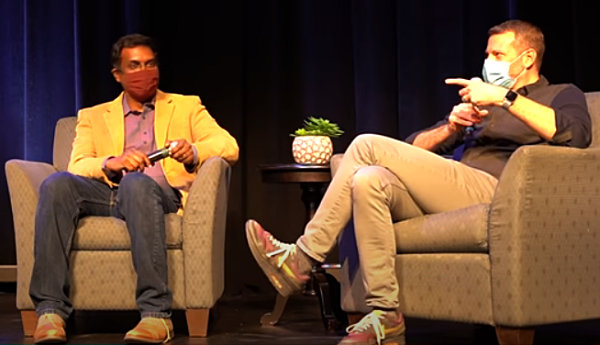Video: The Question of Human Origins: A Christian and Atheist Discuss

This video is a recording of a discussion that took place February 9 and was posted to YouTube, I think, around March 16. I mention it in case anyone else tried to watch the live broadcast; the sound quality of the live broadcast was so poor that I had to bail out. I finally got an opportunity to watch the recording yesterday.
On to business: The discussion was not exactly a discussion; it was not exactly about human origins; and “Christian” seems to have been defined more or less to mean “evangelical Christian.” That said, it was an interesting discussion, lasting about an hour and a quarter.
The protagonists were Nathan Lents, Professor of Biology at John Jay College of Criminal Justice, representing atheism, and Joshua Swamidass, Associate Professor of Immunology and Pathology at Washington University in St. Louis, representing evangelical Christianity. Professor Lents is the author of Human Errors: A Panorama of Our Glitches, from Pointless Bones to Broken Genes. Professor Swamidass is the author of The Genealogical Adam and Eve: The Surprising Science of Universal Ancestry, which I reviewed on Panda’s Thumb here.
I confess that I was somewhat skeptical when I found that the discussion had been hosted by the Veritas Forum, primarily, I suppose, because I am suspicious of anyone who thinks they know the truth. They have, however, hosted speakers such as Peter Singer, Steven Pinker, Antony Flew, and Christopher Hitchens, so I persevered.
Professors Lents went first and devoted his 15 minutes to the proposition that scientists who study evolution have a “bazillion” lines of evidence, not just a few fossils. Indeed, there is a nearly perfect consensus that evolution happens, as opposed to debate as to how it happens. Humans have played by the same rules as any other animals. I won’t go into detail, but Prof. Lents adduced evidence from anatomy (homology, vestigial structures, and suboptimal design), biochemistry, and archaeology (evolution of stone tools, for example). Alas, he ran out of time precisely as he was about to discuss genetic evidence.
Professor Swamidass took his 15 minutes next. Though he is a computational biologist, he was raised as a young-earth creationist, believing that the earth was around 6000 years old, God created everything from scratch, and evolution is not true. He eventually came to recognize three things, roughly chronologically and over an extended period: (1) Human evolution fits with scripture. Importantly, he seems to think that scripture must take precedence, and scripture and science must be fitted together, though I think that assumption was not stated explicitly. (2) The arguments against evolution are very shallow. (3) The real challenge is human evolution. Eventually, however, Prof. Swamidass came to believe that Adam and Eve were two people created without parents, less than 10,000 years ago, and they were the ancestors of everyone – yet we have a common ancestor with the great apes. Can it all be true? Professor Swamidass thinks it can, and some of his evidence is detailed in the review in Panda’s Thumb linked above.
Following the presentations, Jeremy Purvis, Associate Professor of Genetics at University of North Carolina School of Medicine, moderated a brief discussion. I will mention a few highlights and let you watch it for yourself.
Professors Swamidass and Lents, interestingly, met when they were both attacked by the Discovery Institute after having published their books. They have since become fast friends, as was made evident by the tenor of the discussion. As Prof. Lents noted, there is no such thing as bad publicity, and I wish someone would attack one of my books.
The moderator asked whether there are any questions that only science can answer and questions that only scripture can answer? I thought it would have been more fair to substitute “religion” or maybe even “philosophy” for “scripture.” The two speakers agreed to the somewhat anodyne proposition that there are lots of important questions that are beyond science. Professor Lents, however, added that we all have similar values, and we should stop fighting over evolution vs. creation. Indeed, he thinks he learns more by talking with people he disagrees with.
Other questions involved the flood, ghost ancestors (ancestors with whom, oddly, you share no DNA), and the people outside the Garden of Eden. I was gratified but not surprised when Prof. Swamidass stated that a close reading of the Hebrew suggests that the flood was not worldwide. One of the good things about language is that it is imprecise enough that you can interpret any Biblical passage in any way that is congenial to you.
